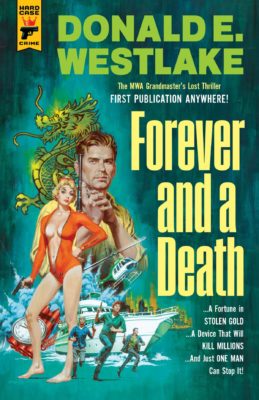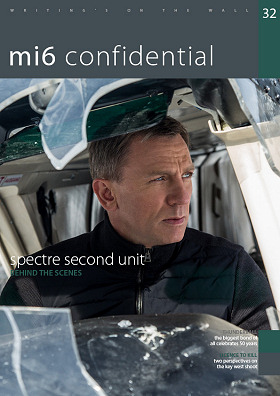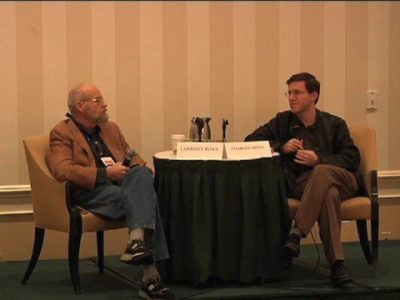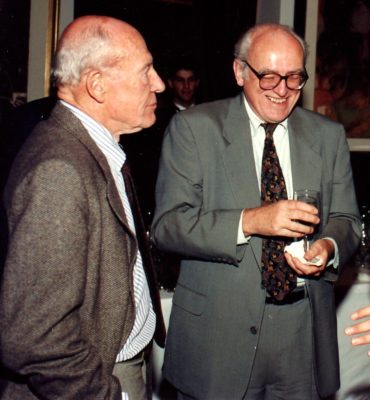 Sometime in 2012, Charles Ardai, writer, editor, entrepreneur and co-founder of Hard Case Crime, was chatting with Abby Westlake when an unpublished manuscript came up in their conversation. It was called Fall of the City and it was loosely based on a treatment Donald Westlake had written under contract with Eon Productions/United Artists for James Bond film #18, which would eventually be released (with scant few ideas from Westlake’s original treatment) as Tomorrow Never Dies in 1997. Abby didn’t have, or couldn’t find, a copy of the manuscript among Don’s papers so she asked the archivists at the Howard Gotlieb Archival Research Center in Boston University, to which Westlake had donated a substantial amount of his papers and works, to send her a copy. She forwarded the copy on to Ardai and they discussed editing and publishing the manuscript, but sometime in 2013 they both got busy with other things and nothing happened for a while.
Sometime in 2012, Charles Ardai, writer, editor, entrepreneur and co-founder of Hard Case Crime, was chatting with Abby Westlake when an unpublished manuscript came up in their conversation. It was called Fall of the City and it was loosely based on a treatment Donald Westlake had written under contract with Eon Productions/United Artists for James Bond film #18, which would eventually be released (with scant few ideas from Westlake’s original treatment) as Tomorrow Never Dies in 1997. Abby didn’t have, or couldn’t find, a copy of the manuscript among Don’s papers so she asked the archivists at the Howard Gotlieb Archival Research Center in Boston University, to which Westlake had donated a substantial amount of his papers and works, to send her a copy. She forwarded the copy on to Ardai and they discussed editing and publishing the manuscript, but sometime in 2013 they both got busy with other things and nothing happened for a while.
In 2015, Ardai mentioned that he was “trying to figure out what to do” with the manuscript in correspondence with author Stephen King, who encouraged him to make it happen. At around the same time, Philip Poggiali, an academic librarian at Pace University in Pleasantville, NY, visited the Gotlieb Center in search of what is referenced on the Donald Westlake page of their website as “drafts for James Bond films.” The same page incorrectly lists Fall of the City as being “serialized in the NY Times” without any connection to the Bond material. Poggiali poked through several boxes at the archives and discovered the manuscript based on the same research Westlake had done for the Bond treatments. Poggiali’s research eventually led to the publication of an article he penned for the magazine MI6 Confidential (Issue #32, Vol. #9, Oct. 2015), in which he concludes:
Judging by letters between Westlake and his editor, ‘Fall of the City ‘ was not well-received by its proofreaders and the author, discouraged by negative feedback, lost interest in getting his manuscript published. It may still see the light of day (Hard Case Crime has already published two of the author’s novels posthumously), but that would entail significant editing.
Not satisfied with merely being prophetic in print, Poggiali sent a copy of the magazine, in early 2016, to Charles Ardai and encouraged him to publish Fall of the City as a Hard Case Crime title. According to Ardai, “a month later, I found myself talking with Lawrence Block about the book and he encouraged me to finally get off my butt and start working on it seriously, and around the same time I was chatting with Jeff Kleeman and discovered that he was the person who originally got Don involved with the Bond movie, and it finally felt like enough stars had aligned that I should do it.” Jeff Kleeman–who, as fate would have it, is a longtime friend of Ardai’s–was Vice President for Production at United Artists in 1995 and, indeed, the person who contracted Westlake to write the first treatment for Bond 18. From the opening of Kleeman’s afterword in Forever and a Death:
I discovered the joys of James Bond in 1973, when I was nine years old and my stepfather took me to see Live and Let Die. Two years later I discovered Donald Westlake… Twenty years later, a veteran of all things Westlake and Bond, I joined United Artists, where I found a way to unite them for the first time. Or so I thought.
Kleeman first contacted Westlake in the Spring of 1995. Bill Koenig, editor of the Bond fan blog The Spy Command, cites a 1995 interview with Westlake in The Indianapolis News (now defunct) in which Westlake’s involvement with Tomorrow Never Dies is mentioned. The connection to Westlake was confirmed, although somewhat confusingly, a few months later at a Bond convention in New York, just prior to the release of Goldeneye, Bond 17. With the producer, Michael G. Wilson, and the only credited Bond 18 screenwriter, Bruce Feirstein, on the stage, a Spy Command writer asked about Westlake, which apparently took Feirstein by surprise. Wilson’s answer is oblique, saying only that Westlake might work on a Bond film in the future, perhaps to avoid ruffling Feirstein’s feathers. Clearly, Westlake was no longer on the project at that point, which was in November, 1995. Over the course of roughly six months, Westlake had pitched several ideas, wrote one full treatment and contributed a very small amount to a second treatment. In his review of the final part of the second treatment for the MI6 Confidential article, Poggiali notes, “This section is so derivative, either of earlier treatments or earlier Bond movies, that it is difficult to imagine anything originated with Westlake.”
 Poggiali, acting the completist, updated Westlake’s Wikipedia page with the new information he uncovered and a reference to his article in MI6 Confidential, which caught the eye of writer and devoted Westlake fan, Greg Tulonen. Tulonen contacted the Gotlieb Center to arrange for a reading of the manuscript. In an email he said, “The archive did not respond to my initial request, and upon my follow-up inquiry, expressed some reluctance, as I was not researching a project or involved in an active course of study. (This is hardly surprising, as an archive’s job is to preserve, not disseminate.) Still, I persisted, citing my active participation in… [the] “fredfitch” blog comments community. This was apparently enough to grant me a reading.”
Poggiali, acting the completist, updated Westlake’s Wikipedia page with the new information he uncovered and a reference to his article in MI6 Confidential, which caught the eye of writer and devoted Westlake fan, Greg Tulonen. Tulonen contacted the Gotlieb Center to arrange for a reading of the manuscript. In an email he said, “The archive did not respond to my initial request, and upon my follow-up inquiry, expressed some reluctance, as I was not researching a project or involved in an active course of study. (This is hardly surprising, as an archive’s job is to preserve, not disseminate.) Still, I persisted, citing my active participation in… [the] “fredfitch” blog comments community. This was apparently enough to grant me a reading.”
[The “Fred Fitch” Tulonen mentions (real name redacted), for those who don’t already know, is the blogger who runs The Westlake Review, dedicated to reviewing every Westlake book ever written (phew!) and a wonderful place to discuss and argue all things Donald Westlake. There’s a permanent link to the blog right down there on your left.]
Tulonen posted an article on his website shortly after his visit, including some background and a review of the original 610-page manuscript. He takes issue with some of the comments from Westlake’s friend and agent Knox Burger, which I think owes to the fact that Tulonen didn’t know their relationship. Knox was a good friend with a long and successful career in the New York literary market. He was always gracious and kind but he was also blunt and no-nonsense. Westlake wouldn’t have wanted it any other way. You should see some of the things DEW said about his children’s attempts to write fiction. He was fair but he didn’t pull his punches. If you took the time to listen, it was insightful but you had to leave the baggage at the door. For Westlake, if you want to be marketable, you better listen to the market, or at least the people who know the market. And Burger knew the market. They trusted each other and had an easy shorthand communication that could seem a bit harsher than it really was to an outside observer.
Tulonen’s article is an interesting read and worth a visit. Asked about his thoughts on how the edited version compared, he said, “For the most part, I believe Ardai did a splendid job with the Hard Case edition — from his editorial decisions to Paul Mann’s cover art. I wish your father had felt encouraged enough to pursue a second draft himself (because there were some narrative hiccups that needed addressing), but Ardai did a fine job with it.” He then went on to detail a few edits he disagreed with. Since I haven’t read the original manuscript and I’m only now getting started on the Hard Case edition, and also because this website isn’t a debate society, I’m leaving that out but someday I’ll circle back and see what Ardai thinks.
So there’s this low rumbling going on about this Bond thing, with Abby Westlake proactively getting the manuscript to Charles Ardai, Philip Poggiali digging it out of the archives while researching Westlake’s involvement with the Bond franchise and Greg Tulonen making a spirit trek to Boston and then publishing the first book review of Fall of the City on his website. Then with encouragement from Stephen King and Lawrence Block, a little nudge from Philip Poggiali and a celestial coincidence with Jeff Kleeman, the spark to edit and publish Fall of the City finally burned bright for Ardai. Abby gave the go-ahead on February 28, 2016 and Kleeman agreed to write the afterword the same day. That’s when the hard work really began. I asked Ardai a few questions via email and he graciously responded with this summation:
When I got the manuscript of FOREVER AND A DEATH – then called FALL OF THE CITY – it was 610 pages long, as I recall, and when I read it, it was very clear that it needed a good editing pass to slim it down. There were long stretches in the book where Don put the crime/thriller plot on hold and wrote what amounted to a travelogue, detailing the restaurants and sights of various foreign locales. And while the writing was typically charming, it just stopped the book dead and needed to come out. There were also some other bits and pieces to fix, such as one character who was lugged along through the climactic scenes even though he literally never had any role to play – he was always just the last guy mentioned as having gone up or down the stairs or into or out of a room, he never did anything else. So he needed to be left back home after the last scene in which he had a role to play. Those sorts of edits are the sort I’ve done on countless of our books, so I had no trouble doing them myself. When Don was alive, I worked with him to make smaller edits to a number of his other books, so I had a pretty good sense of what sorts of changes he’d welcome and which ones he might have resisted. I could hear his voice in my head as I went along, and I like to think I did honorably by him. There was only one page missing from the manuscript, and I had no choice but to write the missing page myself, but I defy anyone to guess which page it was.
When the time came to choose a new title for the book, we had the benefit of the alternate titles Don had suggested when the project was a screenplay for the never-filmed Bond movie. FOREVER AND A DEATH was one of his suggestions, and we all liked it more than FALL OF THE CITY, so we made the switch.
I never considered anyone but Jeff Kleeman to write the afterword. Jeff has been a good friend for many years, and he was the person who first approached Don to work on the Bond film, which means he was the one who lit the spark that led to Don’s writing this book. There was literally no person on earth in a better position to tell the story behind the book than Jeff, and he did a terrific job.
I didn’t leave anything out that I would have liked to include. On the contrary, if I’d been more ruthless, I might have been able to cut a bit more. Thrillers should be lean and tight and zoom propulsively from scene to scene. But some of Don’s delicious character paragraphs were just too good to cut or even trim, so I left them in, out of fondness for them and loyalty to Don. He’s the author, after all. My job as his editor has always been to help make his words shine the best they possibly can, and in the end that means giving his readers the pleasure of reading as much of his wonderful voice as I can, while still keeping the thing moving. I think we wound up with a nice balance.
Perhaps we’ll have a contest sometime to see if anyone, other than people who have read the original manuscript (sorry, guys), can ferret out the page that Ardai added. There are now several reviews of the Hard Case book available online. Kirkus, The Crime Review, Publishers Weekly and Dead End Follies all give brief synopses without spoilers. The review by C.J. Bunce at Borg.com includes a photo of cover artist Paul Mann with the almost-complete artwork still on his easel. Reviews with spoilers include The Westlake Review, the aforementioned article by Greg Tulonen and The Complete Review.
What you will not find in Forever and a Death is James Bond, or even a James Bond stand-in. The book is an action-adventure but it is not a 007-style, dashing man in tux runs across slate rooftops in dress shoes and never once falls down kind of book. There’s no Q or M, or any other letter of the alphabet soup that surely must get tiresome to the staff at MI6 (“Why can’t I just call him Joe? His name’s Joe, for Pete’s sake… oh sorry, Pete, um– I mean Y… Dammit!”). What you will find is another Donald E. Westlake novel, and what more do you need than that?




Thanks for the mention of The Spy Command. I’m the editor of the blog. I was the one who asked Michael G. Wilson (with Bruce Feirstein present) about the Indianapolis News interview with Donald Westlake.
I can see what Knox Burger and others were talking about. I’ve never seen the original manuscript either, but the published book as edited by Ardai shows rough spots that Westlake himself would have needed to iron out, and it would have been a large time investment for a book that would have remained a hard sell for him at that stage of his career, when everybody thought of him as either comic caper guy or Richard Stark. If he’d worked with a good editor, I think it could have been one of his best books that doesn’t fall into his usual niche. (And that’s a lot of books, because he was always breaking out of his usual niche).
I think Greg’s feeling was the the comments as reported were overly harsh, and overlooked the genuine merits of the work. There are real breathing characters there, and it is very much of a piece with everything your dad wrote, with the same take on human identity, and how it can adapt (or collapse) under pressure. But because (as I think) he was writing more in Timothy J. Culver mode than as Westlake, Stark, Coe, et al (though you can see hints of others in the ensemble), without much of the trademark whimsy, it didn’t feel like him–or at least wouldn’t to much of his readership. That I would take to be Burger’s point, and it was well-taken. He’d done a much better job with Kahawa, and that was not a success for him.
It was a huge challenge he took on–to take the inherently artificial contrived premise of a Bond story (which Fleming never intended anyone to take seriously) and somehow bring it into a more believable reality, with people who somehow got miscast as heroes or villains, when they’re really just ordinary people, albeit with some useful skills.
I found it fascinating, however flawed. Well I must have, since I gave it a four part review. It would have been a great shame if it never saw the light of day. But yes, Knox Burger’s job was not to cater to the curiosity of fans, but to the needs of a career that still had some mileage left in it.